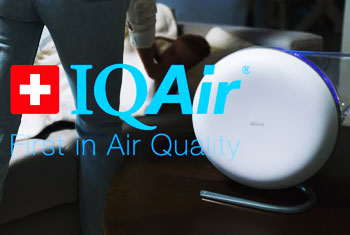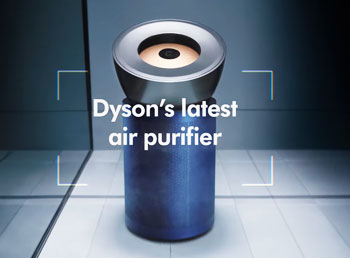Air purifiers have become increasingly popular in recent years as people look for ways to improve indoor air quality. Two of the most well-known brands are IQAir and Dyson.
But which one is better? Here is a detailed comparison of the key features, performance, and other factors to consider when choosing between IQAir and Dyson air purifiers.
A Brief Comparison Table
| Feature | IQAir | Dyson |
| Filtration Technology | HyperHEPA filter, up to 99.5% filtration on 0.003 microns | HEPA filter, up to 99.95% filtration on 0.1 microns |
| Room Coverage | Up to 1,125 sq ft | Up to 800 sq ft |
| Noise Level | 22 dB to 68 dB | 4 dB to 77 dB |
| Air Quality Sensors | Yes | Yes |
| App Control | Yes | Yes |
| Design | Boxier, industrial look | Sleek, futuristic design |
| Cost | $799 to $899 | $449 to $699 |
| Warranty | 6 years | 2 years |
| Filters | Need replacing every 4-5 years | Lifetime filter, no replacement needed |
Overview of IQAir
IQAir air purifiers use HyperHEPA filtration technology to remove ultrafine particles down to 0.003 microns in size. This includes allergens like pollen, mold spores, pet dander, and dust mites. The HyperHEPA filter is able to capture over 99% of particles at this size.

Some key features of IQAir purifiers:
- Room coverage from 322 to 1,125 sq ft depending on model
- 100% sealed filters with no air leakage
- Modular design so you can add components like VOC filters
- Built-in air quality monitor shows real-time particle levels
- Whisper-quiet operation from 22 dB to 68 dB
- Multiple fan speeds and timer settings
- App control via smartphone
The housing has a squared-off, boxy design with a Swiss industrial aesthetic. The controls are fairly simple to use directly on the unit. IQAir systems range from $799 for a small room purifier up to $899 for a large 1,125 sq ft purifier. The filters need replacing every 4-5 years.
Overview of Dyson
Dyson air purifiers utilize HEPA filtration to capture 99.95% of particles down to 0.1 microns. This includes most pollutants like dust, mold, pet dander and smoke. Key features include:
- Coverage for rooms up to 800 sq ft
- Uses Air Multiplier technology for higher airflow
- Very quiet operation from 4 dB to 77 dB
- Real-time air quality monitoring with LCD display
- Sleek and modern design
- App control, Alexa and Siri voice control
- Tower shape maximizes filtration
- No replacement filters needed
Dyson air purifiers have a signature sleek, futuristic design. The HEPA filter is fully sealed within the tower-shaped housing. Controls are located at the base, with an LCD screen displaying current air quality. Models range from $449 for small rooms up to $699 for large rooms. A key advantage is the filters never need replacing – just occasional washing.
Also Read: Comparison Between Blueair and Dyson
Key Differences Between IQAir and Dyson
Up until this point, we’ve covered the fundamental information. Now, let’s analyze and contrast them based on their crucial characteristics.
· Filtration Technology

The biggest difference between IQAir and Dyson is the filtration technology used. IQAir uses a HyperHEPA filter that can remove particles down to 0.003 microns with 99.5% efficiency. This includes ultrafine particles and allergens.
In contrast, Dyson uses a standard HEPA filter that captures particles down to 0.1 microns at 99.95% efficiency. While effective for most pollutants, it may not catch the smallest nanoparticles. Those with allergies or sensitivities may benefit more from IQAir’s HyperHEPA filtration.
Both brands have tightly sealed filters that prevent leakage, ensuring all air passes through the filter medium. IQAir’s modular design also lets you add components like gas/VOC filters for a more comprehensive clean.
· Room Coverage
For room coverage, Dyson air purifiers are rated for spaces up to 800 sq ft which is suitable for large living rooms and open floor plans.
IQAir systems can cover 322 to 1,125 sq ft depending on the model. The larger options can easily purify extra-large rooms over 1,000 sq ft. Those with big indoor areas to clean may prefer IQAir’s greater room capacity.
· Noise Level
In terms of noise, both IQAir and Dyson run at very low decibel levels so they won’t disturb you. Dyson purifiers operate from near-silent 4 dB on the lowest setting up to 77 dB on max.
IQAir has a comparable range from 22 dB to 68 dB depending on fan speed. Both brands allow adjusting the fan to minimize noise as needed. At lower speeds, they are extremely quiet and can even run while sleeping.
· Air Quality Sensors
Both IQAir and Dyson systems have built-in air quality sensors and particulate monitors. They display real-time readings showing PM2.5 levels, VOCs, allergens and other data.
You can see at a glance if indoor pollution is high, and adjust the fan speed accordingly. The sensors also detect when air is cleaner and automatically decrease the speed. This monitoring allows the purifiers to respond intelligently to conditions in the room.
· App Control
The IQAir and Dyson apps allow controlling the purifier remotely via smartphone. You can change speeds, set schedules, monitor air quality, and more. This allows turning on the purifier even when away from home to start cleaning the air before you get back.
Both apps are user-friendly with intuitive interfaces. Dyson also supports Alexa voice controls through compatible devices. The connectivity options make it simple to control these high-tech purifiers.
Also Read: Comparison Between Molekule and Levoit
· Design
In terms of design, IQAir units have a squared-off, boxy shape with a Swiss industrial look. The controls are fairly basic and located on the device itself.
Dyson purifiers feature a sleek, modern tower design. The HEPA filter is built into the hollow center of the tower for smooth, efficient airflow. The LCD display and controls give it a high-tech minimalist aesthetic.
It’s mainly an issue of personal taste – IQAir aims for function over form, while Dyson has a striking contemporary style.
Also Watch This Review Video:
· Cost
For price, Dyson air purifiers range from $449 for small models to $699 for the larger options. This puts them at the mid-to-high end of the market.
IQAir systems run from $799 to $899 depending on room coverage. This positions them as high-end, premium models given the higher price tags. Those wanting the best may find IQAir worth the extra cost.
· Warranty
IQAir purifiers come with an impressive 6 year warranty covering defects and workmanship. This demonstrates the brand’s confidence in their construction quality.
In contrast, Dyson only provides a 2 year limited warranty. While still decent coverage, IQAir’s extra years of protection is noteworthy when making a big investment.
· Filters
One of Dyson’s biggest selling points is the lifetime filter requiring no replacements. The HEPA medium can last for years with occasional washing to remove particulates. This makes long term operation simpler and more affordable.
IQAir’s HyperHEPA filters require changing every 4-5 years depending on usage. Replacement filters cost around $99 which isn’t excessive, but still an added cost over time. Those wanting maximum convenience may prefer Dyson’s filter-free design.
Also Read: Comparison Between the 311 and 411
Frequently Asked Questions (FAQs)
Yes, IQAir purifiers are extremely effective at removing airborne particles thanks to their advanced HyperHEPA filtration. Their systems are proven to eliminate 99.5% of particulates down to 0.003 microns, including allergens, VOCs, smoke, and viruses. This can significantly improve air quality.
Dyson air purifiers stand out for their sleek, futuristic designs and patented technology like Air Multiplier and vacuum-sealed filters. Performance-wise, they effectively clean the air but may not reach the same ultrafine particle removal levels as IQAir. However, their filterless design is convenient. Overall, Dyson is competitive with other premium purifier brands.
Dyson purifiers have some unique advantages including no filter replacements needed ever, very quiet operation, and intelligent auto-sensing technology. The bladeless design also allows for smooth, high-velocity airflow. Dyson also offers appealing modern aesthetics. For those features, some may consider them better than lower-end purifier models.
Dyson air purifiers consistently rank among the top-rated brands on the market. While not the absolute best for those seeking medical-grade filtration, they offer strong performance and innovative features for the price. Dyson is comparable with other top brands like Blueair and Coway, ranking high on lists of leading air purifiers.
Also Read: Comparison Between Winix and Dyson
Final Thoughts
In summary, IQAir and Dyson both make high-performing air purifiers, but with different strengths. IQAir is superior for ultrafine particle filtration and larger room capacity. Dyson offers convenience with its lifetime filter, very quiet operation, and attractive modern aesthetics.
For serious allergy relief, IQAir’s HyperHEPA systems may be preferable. Those wanting low maintenance and advanced smart features may favor Dyson. Overall you can’t go wrong with either brand when it comes to clean, purified indoor air.
Consider your specific needs and room size to decide which technology is the better fit. Both IQAir and Dyson are leaders in the air purification space.
